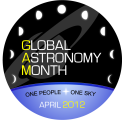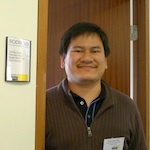GAM 2012 Blog
|
April 9 By Rogel Mari Sese |
Back to the GAM Blog |  |
| Astronomy is considered to be one of the oldest branches of science known to man. |
||
Since the dawn of time, mankind has always held the sky in awe due to its numerous wonders and immensity. Historically speaking, astronomy has always inspired and spurred the development of science and technology.
The universality of astronomy also makes it an excellent area for breaking geographical and cultural barriers. In 2009, the International Astronomical Union (IAU) together with UNESCO declared it to be the International Year of Astronomy. A worldwide program for astronomy was developed and implemented which was participated by more than 100 nations. To date, the IYA 2009 has been the most successful science outreach and was participated in by more than 10,000 volunteers.
The Philippines was part of the IYA 2009 Celebrations. However, the impact of the IYA was not greatly felt in the Philippines. Except for few people in urban areas such as Metro Manila, the general public and academia was oblivious to the events of IYA. As such, the Philippines missed an excellent opportunity for developing astronomy and increasing public awareness.
The IAU, working on the momentum generated by IAU, decided to create a decadal plan for developing astronomy in developing countries such as the Philippines. Being a major country in Southeast Asia, the Philippines can play a big role in astronomy. Yet, it is one of the underdeveloped branches of science in all levels of education. For a science that is both highly technical and equally inspiring, the Philippines is lagging behind in terms of astronomy education and research.
To start with, there are very few astronomers with doctorate degrees in the country. This is because astronomy is usually not seen as a good career choice due to lack of employment opportunities. There is no centralized agency to handle astronomy and space science. Currently, it is being managed by three different government agencies. In addition, only one university is offering an astronomy-related course in the tertiary level. Most of the astronomy researches are actually done by the physics departments in different universities.
Despite these problems, there is a steadily increasing interest in astronomy among primary and secondary schools. Amateur astronomy organizations are active in conducting lectures and telescope viewing sessions all over the country. Students are usually very excited and the joy in their eyes when they see Saturn or Jupiter is simply indescribable.
However, I think the best way to rapidly promote astronomy in the Philippines is to train science educators all over the country about astronomy. This is the usual comment that we received from teachers: they want to teach astronomy but they don’t know how and what to teach. By training teachers, teaching them the materials and showing them all the available resources online, they become empowered and confident to teach astronomy to students. It is principle of educator empowerment that would provide a crucial step in developing astronomy education in the Philippines. Given our 7107 islands, it is physically impossible for a handful of professional astronomers to teach astronomy to the students. It is important that we tap our educators to provide a sustainable system for astronomy education. As the national hero of the Philippines, Dr. Jose Rizal once said, the children are the hope of the motherland. Who else will be molding these young minds other that our tireless and dedicated educators? Let’s help them so that they can help us!
|
|
Rogel Mari Sese, also known as Rogel or Romar, was born and raised in Los Baños, a university town 60 km south of Manila, Philippines. Having been exposed to an academic environment at a young age, he learned a lot about science from his parents and the surrounding community. After earning his Bachelors degree in his hometown, Rogel spent several years teaching at the university, whilst pursuing his Masters degree in Manila. He then obtained his doctorate at the University of Tsukuba in Japan, specializing in computational astrophysics. As one of the few Filipino astrophysicists, he always keenly encourages people to pursue careers in astronomy and astrophysics. He recently returned to the Philippines with the dream of developing astronomy and space science in the country through education, research, collaborations and public outreach. Rogel is currently teaching at the University of the Philippines Los Baños, Focal Person for the Philippine Space Science Education Program and Chair of the Southeast Asian Young Astronomers Collaboration. |








